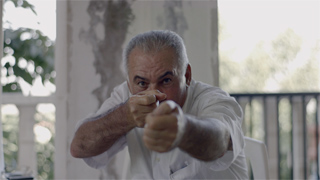A Feeling Greater Than Love
 LEBANON / 2017 / Arabic / Color, B&W / Digital File / 93 min
LEBANON / 2017 / Arabic / Color, B&W / Digital File / 93 min
Director, Script: Mary Jirmanus Saba
Photography: Karam Ghoussein, Mary Jirmanus Saba, Ziad Chahoud
Editing: Louly Seif
Sound Design: Tareq Rantisi
Executive Producer: Rasha Salti
Producers: Mary Jirmanus Saba, Lara Jirmanus
World Sales: Tricontinental Media
www.afeelinggreaterthanlove.com
The labor and political movements of striking factory workers and tobacco farmers in early 1970s Lebanon have since been overshadowed by the region’s history, starting with the 1975 Lebanese Civil War. Vibrantly reflects on the era, bringing together a divergence of views through a gathering of testimonials from the young men and women who took the lead during the turbulent social upheaval. Interlaced with a variety of footage, including work by Christian Ghazi that at the time foreshadowed popular uprisings and the approaching civil war, as well as Red Army / PFLP: Declaration of World War, that captured the glimpse of the era on celluloid, the film reclaims and breathes new life into the people’s revolution.
[Director’s Statement] On July 11, 2011, I received this email from Nadine, who became one of the film’s protagonists. Listening to her speak about the 1972 uprising and the revolution it almost launched, she could be voicing the thoughts of my own generation, our hopes for the potential of the Arab Spring.
For me, the same questions linger, about past and present, about Lebanon, the Middle East and beyond: What produced those moments of seeming revolutionary possibility, and why did the revolution fail? Are we repeating the same gestures of popular movement, and do they bring us closer to justice and equality? Today, what to do with such desire for change and unity?
I began my research in 2010 in a time of relative apathy. Returning to Lebanon after working as a farmworker organizer and community television producer in Latin America, I wondered why our own Arab social movements paled in comparison. Looking to the past, the Gandour and tobacco farmer strike emerged—linked in popular memory as the cusp of revolutionary possibility and social unity in Lebanon in 1972–73, right before the country devolved into civil war. Following the trail of Fatima, a girl whose death at the hands of Lebanese police galvanized the nation, I searched for the answers to my questions.
The film proceeds as if in a dream, through the memories of our main characters, their personal stories of political involvement and disillusionment. An exploration of the past and its traces today in the gestures of everyday life.
A geographer who uses film and other media to explore unknown histories of the Arab world and beyond, seeking new transformative possibilities in spaces—hidden and obvious alike. She holds a B.A. in Social Studies from Harvard College, an M.A. in Geography from the University of California, Berkeley, and was a 2014–2015 participant in Ashkal Alwan’s Home Workspace Program. Her feature debut A Feeling Greater Than Love won the FIPRESCI Prize at the 2017 Berlin International Film Festival in the Forum section.
